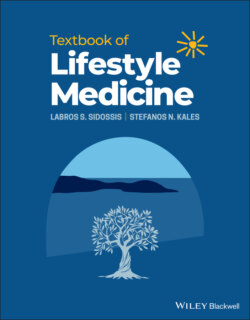Читать книгу Textbook of Lifestyle Medicine - Labros S. Sidossis - Страница 30
Key Point
ОглавлениеObesity is the consequence of a long-term energy imbalance, whereby energy intake is higher than energy expenditure.
Overall, these unhealthy lifestyle behaviors and habits seem to be the result of environmental and social changes associated with the lack of supportive policies in sectors such as health, agriculture, education, transportation, urban planning, environment, distribution, and food trade. Although their involvement in the pathogenesis of obesity has not been fully elucidated, it is now clear that social and environmental factors may influence food intake and energy expenditure more than the internal regulatory mechanisms that regulate people’s weight. Moreover, the human body has been programmed to preserve energy, and this has deleterious effects when people are found in an obesogenic environment (Table 2.1). The proclivity of an individual to these environmental influences is affected by genetic and other biological factors.
TABLE 2.1 Technological clashes with our biology.
Source: Popkin et al. (2012).
| Biology | Technology |
|---|---|
| Sweet preferences | Cheap caloric beverage revolution |
| Thirst and hunger/satiety mechanisms not linked | Caloric beverage revolution |
| Fatty food preference | Edible oil revolution – high‐yield oilseeds, cheap removal of oils |
| Desire to eliminate exertion | Technology in all phases of movement/exertion |
